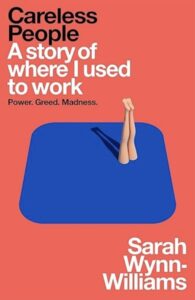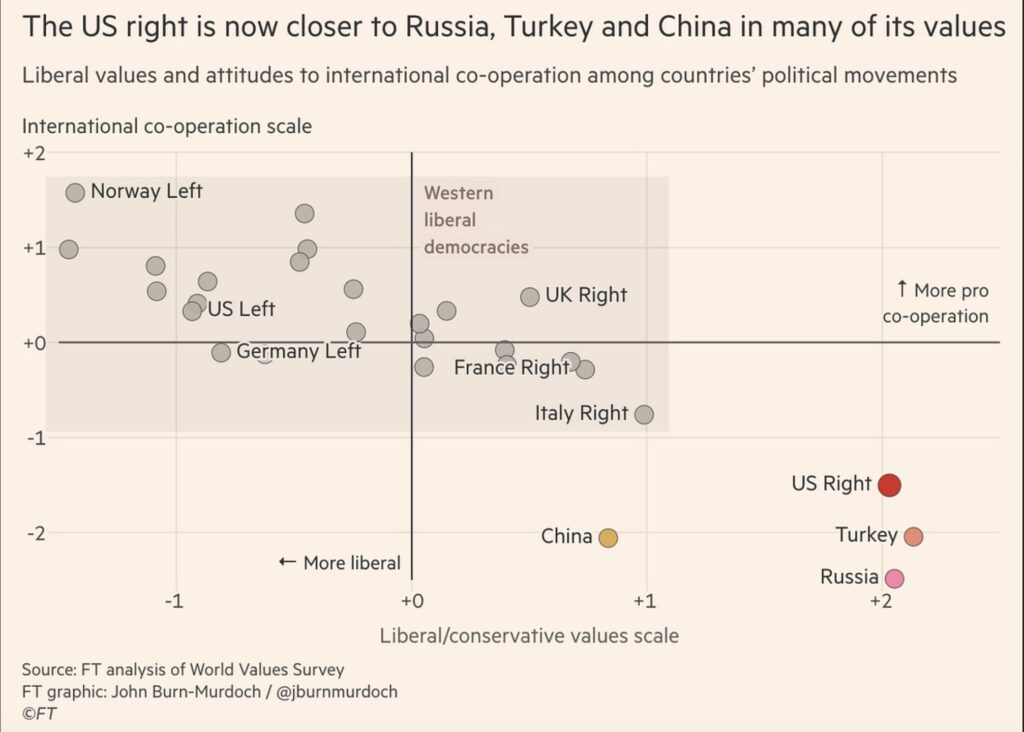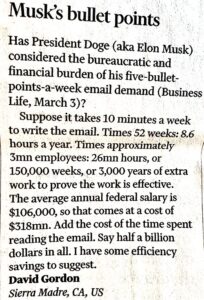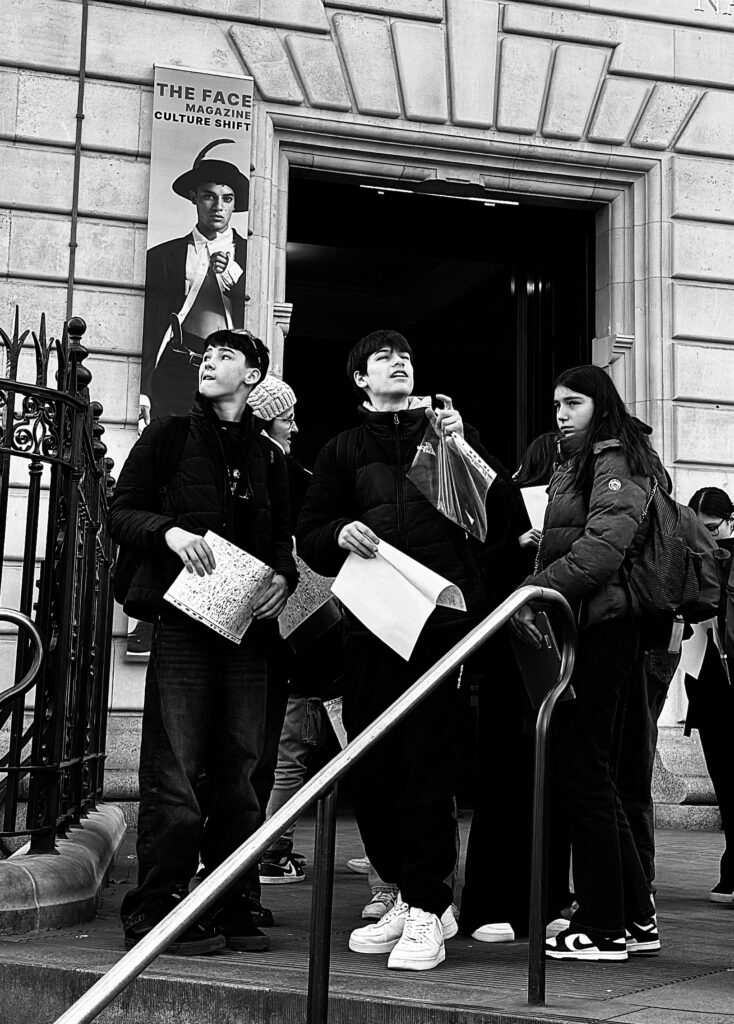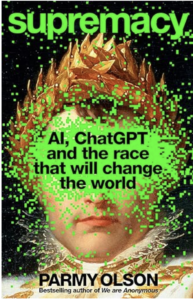Letting sleeping cats lie

The view from the front garden of the Fitzwilliam museum on Friday afternoon. Note the snoozing lions on the left.
Quote of the Day
”The most affectionate creature in the world is a wet dog.”
- Ambrose Bierce
Musical alternative to the morning’s radio news
Tom Waits | Picture in a Frame
Really wonderful.
Long Read of the Day
AI: A Means to an End or a Means to Our End?
Text of a truly remarkable lecture by Stephen Fry. It’s long, but unfailingly thoughtful and perceptive. If you read nothing else this week, read this.
Here’s a sample to whet your appetite:
I’ll take you back fifteen or so years to a time when I found myself being invited to a perfectly extraordinary number of corporate, governmental and media talks, conferences, summits and suchlike gatherings. I would be asked to address delegates and attendees on the subject of a new microblogging service that had only recently poked its timorous head up in the digital world like a delicate flower but was already twisting and winding itself round the culture like vigorous bindweed. Twitter it was called. I had joined early and my name seemed permanently associated with it. What an evangel I was. Web 2.0, the user-generated web, was going great guns at this point. Tick off the years. 2003 MySpace began. 2004 Facebook launched. 2005 YouTube. 2006 Twitter. 2007 the iPhone. 2008 the App Store and later that year, Android and then Instagram. Bliss was it in that dawn, etc. etc. I confidently predicted that this new kind of citizen-led computer and internet use would help build a brave and beautiful new world. “Local and global rivalries will dissolve,” I said. “Tribal hatreds will melt away. Surely,” I cried, “Twitter and Facebook and this new world of ‘social media’ will usher in an age of universal brotherhood and amity.” Two years later as Tunisia, Libya, Egypt, Yemen and Syria rose against their dictators, the Arab Spring bloomed. How right I had been. How clever and percipient I was.
But…
Just a year or so on and that blissful dawn had turned into the darkest of nights. Libya leapt out of the frying pan of Gaddafi into the fire of anarchy and chaos, Egypt into a military coup, Yemen into brutal civil war, Syria into a bloodbath. Elsewhere — Brexit, Trump, TikTok, COVID, the rise of nationalist populism and populist nationalism, state sanctioned and criminal cyber terrorism, epidemics of anxiety, depression and self-harm amongst our children and young adults, and a cloud of disappointment, pessimism, mistrust and despair over us all. Pandora had opened her box and the ugly horrors had flown out to infect us all. With Hope left trapped inside.
Welcome to today.
What a whistleblower’s exposé of the cult of Zuckerberg reveals
My OpEd in yesterday’s Observer.
There’s nothing more satisfying than watching a corporate giant make a stupid mistake. The behemoth in question is Meta, and when Careless People, a whistleblowing book by a former senior employee, Sarah Wynn-Williams, came out last week, its panic-stricken lawyers immediately tried to have it suppressed by the Emergency International Arbitral Tribunal. This strange institution obligingly (and sternly) enjoined Wynn-Williams “from making orally, in writing, or otherwise any ‘disparaging, critical or otherwise detrimental comments to any person or entity concerning Meta, its officers, directors, or employees’ ”. To which her publisher, Macmillan, issued a statement that could succinctly be summarised thus: “Get stuffed.”
Clearly, nobody in Meta has heard of the Streisand effect, “an unintended consequence of attempts to hide, remove or censor information, where the effort instead increases public awareness of the information”. The company has now ensured that Wynn-Williams’s devastating critique of it see our review in the New Review will become a world bestseller.
Among the many delicious ironies here is that Mark Zuckerberg, Meta’s Supreme Ruler, who has recently become a loud advocate of “free speech” – or at least free speech as understood by the Trump regime – is trying to suppress Wynn-Williams’s troublesome speech. The old-fashioned term for this is hypocrisy. But then her six years spent in the Supreme Leader’s inner circle will have inured her to that…
Books, etc.
How not to build a nation

Screenshot
Simon Kuper’s New Statesman review of Ezra Klein’s and Derek Thompson’s new book. He quite likes it.
In November 2021, Joe Biden passed what his government called “the biggest infrastructure bill in generations”, worth $1trn. Part of the idea was to convert the US to green energy, an essential step in the battle against climate change. To cite just one of countless line items: the government provided $7.5bn to build 500,000 charging stations for electric vehicles. Here’s the problem: by March 2024, the number of charging stations actually built and working was seven.
Abundance reminds us that the UK isn’t the only country that has forgotten how to build. But given that American dysfunction outdoes that of any other developed country, there is reassurance here for British readers. Whereas American politics has become a contest of insanity versus non-insanity, the UK’s governing classes have at least begun asking the right questions: how to build millions of homes and a new green infrastructure?
Ezra Klein, a columnist and podcaster at the New York Times, and Derek Thompson, a staff writer at the Atlantic, are journalists with bigger brains and internal databases than is common in our profession. They have sidestepped the current American political horror show to produce something original: a left-liberal manifesto for deregulation, or as they call it, “a liberalism that builds”. Only that can create green-fuelled abundance…
My commonplace booklet
Truth and Falsity in AI
Erik Larsen has been reading a chapter in a forthcoming book by the psychologist Martin Seligman who has been interacting with LLMs and had been puzzled by an ‘hallucination’ that the AI produced at one point. Why had it done that when it had no need to confabulate?
At which point Larsen steps in with a useful insight. LLMs have to base all their responses on what the have already ‘read’. Here’s his argument:
Philosophers distinguish between two fundamental theories of truth: correspondence and coherence. Under the correspondence theory, a statement is true if it accurately reflects reality—“the cat is on the mat” is true if, in fact, the cat is actually on the mat. The coherence theory, by contrast, holds that a statement is true if it fits within a system of other accepted truths. For example, “I am the only son of my parents” is true under coherence if it aligns with other known facts: I have no brothers, I’m not adopted, and so on.
In both cases, the question is the same: Under what conditions is this proposition ‘p’ true? But the answers are radically different. The correspondence theory demands external verification—truth is discovered by checking against the world itself. The coherence theory, on the other hand, stays internal—truth emerges from consistency with prior knowledge. One seeks reality; the other seeks logical harmony.
This philosophical distinction has been debated in academic circles for centuries, but Seligman instinctively grasped its relevance to AI. When he asked Anthropic’s Claude which of these theories better describes how it “knows” things, it responded—quite plausibly—that it operates on coherence. This is unsurprising: a large language model (LLM) exists entirely in cyberspace, disconnected from the world. It cannot directly verify anything against external reality; it can only produce statements that fit within the linguistic and statistical patterns it has absorbed.
This Blog is also available as an email three days a week. If you think that might suit you better, why not subscribe? One email on Mondays, Wednesdays and Fridays delivered to your inbox at 5am UK time. It’s free, and you can always unsubscribe if you conclude your inbox is full enough already!





